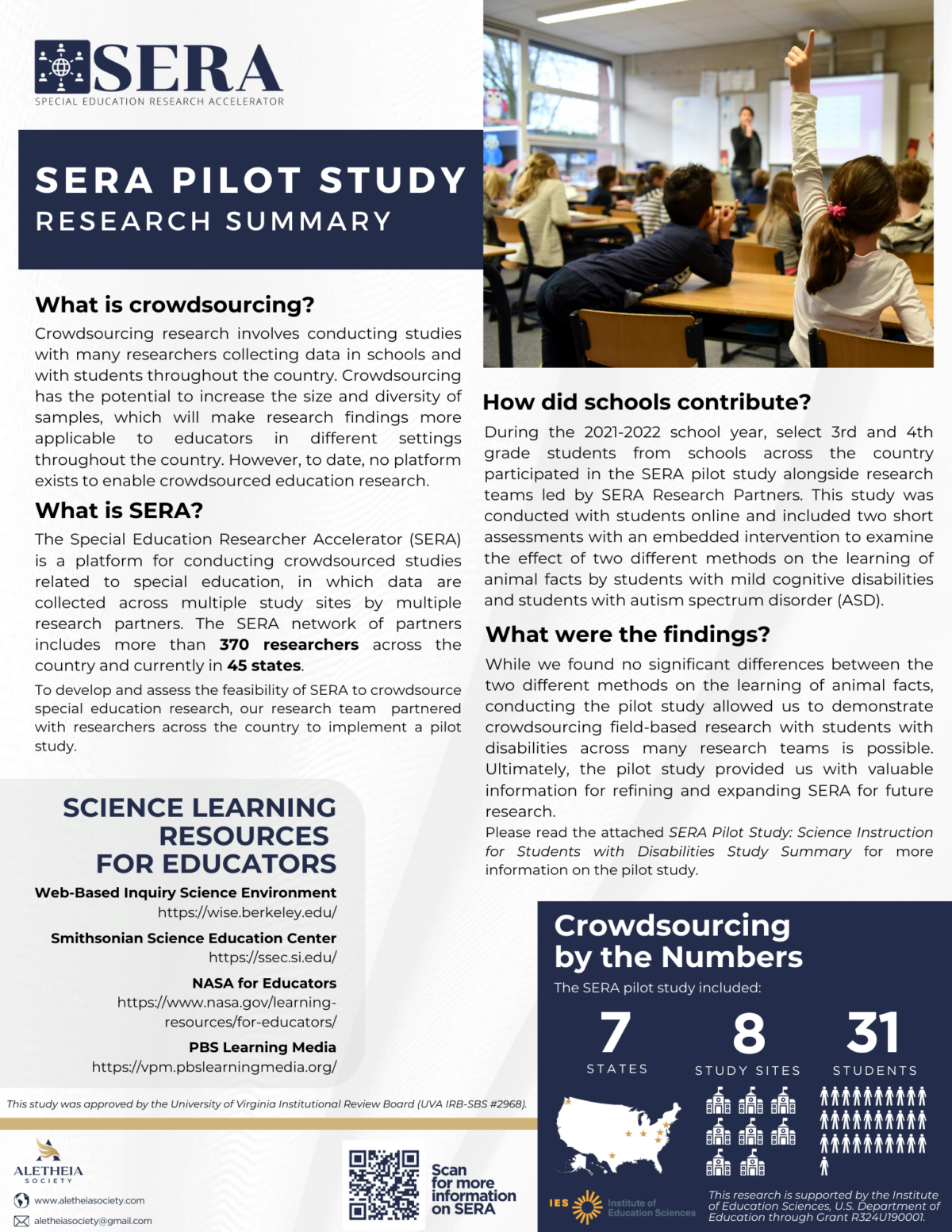Study Recap: The SERA Pilot Study (2021-2022)

In this project, we developed and piloted a platform for crowdsourcing research in special education, enabling numerous researchers to collect data in schools throughout the country. Crowdsourcing has the potential to increase the number and diversity of students participating in studies, making research findings more relevant to educators in various settings nationwide. However, until now, no platform existed to facilitate crowdsourced special education research.
Our crowdsourcing platform, the Special Education Research Accelerator (SERA), is hosted on the SERA website (https://edresearchaccelerator.org/). It provides resources to support research partners nationwide in implementing study procedures consistently, such as video trainings, detailed data collection protocols, and access to the SERA Data Portal. We have also recruited a network of over 350 doctoral-level researchers interested in participating in crowdsourced research in special education, some of whom took part in this pilot study.
To pilot our crowdsourcing platform and process, we designed an experiment to test the effects of prompting elementary students with high-incidence disabilities to generate explanations on remembering animal facts. In a previous study, Scruggs and colleagues (1994) found that students who generated their own explanations had significantly greater immediate and delayed recall (after one week) of animal facts compared to a control group that merely repeated the facts. This study involved 36 fourth- and fifth-grade students with high-incidence disabilities in the Ohio River Valley. We replicated this study to determine if we would observe the same effects with a different group of students from across the country.
Example Animal Facts and Explanations
| Fact | Explanation |
| The emperor penguin carries its eggs on top of its feet. | The emperor penguin carries its eggs on top of its feet because the emperor penguin lives in an icy world and has to keep its eggs off the ice to keep them warm. |
| Some frogs lay eggs that sink in water. | Some frogs lay eggs that sink in water because eggs that have sunk to the bottom of the water are harder for other animals to find and eat. |
| The aardvark can completely close its nostrils. | The aardvark can completely close its nostrils because the aardvark digs in the dirt for food and needs to keep dust, dirt, and bugs from getting in its nose |
Due to the pandemic, we redesigned the pilot study to allow researchers to implement procedures and collect data online. The pilot ultimately involved seven research teams from Temple University, Texas Christian University, University of Missouri, University North Carolina-Wilmington, University of Louisville, University of Virginia, and Washington State University-Vancouver. These teams conducted the study with 31 third- and fourth-grade students with high-incidence disabilities from across the country.
In contrast to Scruggs and colleagues’ findings, our study found that prompting students to generate explanations for animal facts did not result in better immediate or delayed recall (after one week) compared to the control group, which merely repeated the facts. This discrepancy between our findings and the previous study’s results may be due to the online delivery of the intervention and/or differences in the student samples. Further research is needed to determine under what conditions and for which students generating explanations of science facts improves recall.
Although we did not find that generating explanations for animal facts helped students recall the facts better than simply repeating them, conducting the pilot study allowed us to demonstrate the feasibility of crowdsourcing field-based research with students with disabilities across multiple research teams. Additionally, it provided valuable information for refining and expanding SERA.
We want to thank our participating SERA research partners, schools, teachers, and students for their invaluable participation in this initiative. Their contributions are fundamental to establishing a robust evidence base aimed at improving students’ future outcomes.
